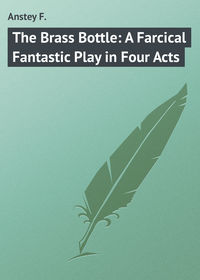
"It depends upon what the piece of jewellery is," said the Fairy.
Queen Selina saw her way to an absolutely crushing rejoinder. "Well, this particular piece of jewellery," she said, "happens to be a paltry ornament which I bought from Miss Heritage before I ever heard of Märchenland."
Her shot had certainly told. "What?" faltered the Court Godmother, obviously out of countenance. "Did I understand you to say you bought that jewel – and from the Lady Daphne?"
"I prefer to call her Miss Heritage – the other is merely a courtesy title. Yes, I did buy it from her. She was in difficulties at the time, and I gave her thirty pounds for it, which was a good deal more than anybody else would have done."
"And – and – have you told this to any other person – the – the Marshal, for instance?"
"My dear Court Godmother, I am not in the habit of proclaiming my acts of charity – for it was an act of charity!"
"An act of charity," said the Fairy drily, "which I should strongly advise you to keep to yourself."
"I intend to," replied the Queen, as she rose with much dignity, though her face was redder than usual. "I should never have mentioned it at all, even to you, Court Godmother, if I hadn't felt it necessary. Of course, in my present position, I should never dream of buying jewellery from one of my own ladies-in-waiting. But it was different then. I hadn't come into my Kingdom, and Miss Heritage was only my governess; and anyway, it was a perfectly fair bargain, so my conscience is absolutely clear. Still," she added, turning on the threshold, "perhaps you will admit now that you were just a little mistaken in attaching any importance to wearing that pendant?"
"Yes," said the Fairy, completely crestfallen and subdued, "I made a mistake – a great mistake – I admit that."
"I thought you would!" returned the Queen triumphantly. "And now I must go to dear Edna and tell her the news about Prince Mirliflor."
She had no suspicion of the state of mind in which, by her unconscious revelation, she was leaving the unhappy Court Godmother, who was so stunned that it was some time before she could think out the situation at all clearly.
The present Sovereigns of Märchenland, it seemed, were nothing but impostors! Innocent impostors, no doubt – but that did not lessen her own responsibility for helping to place them on the throne. If she made the truth known, would the people – worse still, would the ex-Regent – believe that she and the Baron and the Astrologer Royal had not been deceiving them from the first? She recognised now that they had been too ready to accept the wearer of Prince Chrysopras's jewelled badge as the sought-for Queen without some further inquiry – and yet who in all Märchenland would have dreamed of making any? How could anyone have supposed that Queen Selina had merely become the possessor of the jewel by purchasing it from that little Lady Daphne? It seemed to follow that Lady Daphne must be the true Queen. The Fairy remembered now that she had taken her to be so at their first meeting. If only she had thought then of asking a question or two, the mistake might have been discovered before matters had gone too far – but, in her unfortunate anxiety to see a legitimate sovereign ruling Märchenland once more she had taken everything for granted. How could she put it right now without appearing either a traitress to the Kingdom, or at least a foolish old Fairy who ought to have known her own business better? That was a bitter reflection for an autocratic dame who had long been accustomed to consider that age and experience had endowed her with a wisdom which was absolutely infallible.
There was just one faint hope to which she clung. She had been mistaken once – why should she not be mistaken again? Lady Daphne might herself have bought the pendant from some third person. In that case she would have no better claim to the throne than Queen Selina, and matters could be left as they were – which would relieve the Fairy of the unpleasant necessity of having to admit that she was liable to error.
She could not rest till she knew more, and so, as soon as she felt equal to any action, she took her crutch-handled staff, hobbled down the winding steps, and then up more stairs and along a succession of corridors, until she reached the door of the chamber she had been told was Daphne's.
"I shall know very soon now!" she told herself. "And, after all, there's nothing to be uneasy about. Whoever this girl may be, it's most unlikely that she will turn out to be any relation of poor Chrysopras'."
But, in spite of these reassurances, it was a very tremulous hand that rapped at the door, and the Court Godmother's heart sank as she heard a clear sweet voice inviting her to enter.
It would have been such a relief, just then, to find that Daphne was not in her room.
CHAPTER XI
A WAY OUT
Daphne was rather surprised to see the Court Godmother enter, for she had not honoured her by any special notice since her first arrival. But she was pleased, and touched as well, by a visit which she knew must have cost the old Fairy considerable effort.
"I thought I'd come up and see how you were getting on, my dear," began the latter, after sinking into the chair Daphne had brought forward for her, and recovering her breath. "I hope you are happy here – and – and well treated?"
"Quite, thanks, Court Godmother," said Daphne.
"But you shouldn't sit moping here by yourself like this."
"Her Majesty doesn't like me to come down until she sends for me," explained Daphne; "and she hasn't to-day. But I haven't been moping, Court Godmother; I've been listening to the swallows. They're discussing their plans for the winter, and they can't make up their minds where to go, poor darlings!"
"That's only what you fancy they're talking about," said the Fairy sharply; for the gift of understanding bird-language is comparatively rare, and only possessed by those who have a strain of Fairy blood in their descent. "You can't possibly know!"
"I didn't till I came here, and then I suddenly found I could. Princess Ruby declares I make it all up – but I don't. I can even understand what some of the animals have to say, and its rather fun sometimes. The other morning in the Gardens I heard a tortoise telling a squirrel – "
"I daresay, I daresay," interrupted the Court Godmother, who had not come there to hear the small talk of any tortoise; "I find their conversation wearisome myself – and so will you when you've been here a little longer. And so you're comfortable here, are you?" she went on, looking round the chamber, which had walls of mother-o'-pearl with hangings of delicate shimmering blue-green at the window and round the small ivory four-post bed. "Well, this room looks very cool and pleasant. And you've pretty dresses to wear, it seems. I like that one you have on – most becoming, though it wants an ornament of some kind to set it off. But perhaps you don't care for jewellery?"
"I do," said Daphne, "very much. But I haven't any now, you see."
"But you had once, hadn't you? I seem to recollect the Queen telling me she bought something – a pendant, I fancy she said – from you before you came to Märchenland. Or was it somebody else?"
"No, it was me," said Daphne. "It was very decent of her, because I was in rather a hole just then – with a debt I couldn't possibly have paid otherwise – and the pendant was no use to me, you see – not a thing I could ever have worn."
"So you wasted your money in buying an ornament which was unsuited to you, eh?"
"I didn't buy it, Court Godmother," said Daphne, and proceeded to explain – much as she had done at "Inglegarth" – how it came into her possession. The Fairy questioned her about her father, but she had little information to give. Even his name was uncertain, as it seemed he had only moved into his last rooms shortly before his death. All his landlady could say was that it was something foreign which she could not pronounce. But she had gathered from certain things he had let fall that he had led a wandering life as a musician, and had at one period been a riding-master. She believed that, in the latter capacity, he had met his young wife, Daphne's mother, and that it had been a runaway marriage. She died soon after giving birth to Daphne, and left him so broken-hearted that he did not care to make any fight against illness when it came to him, but rather welcomed a death that meant re-union. "But all I really know," concluded Daphne, "is that that pendant belonged to him, and that my adopted Mother took care of it for me till I was grown up. And I think he would not have minded my selling it when I wanted the money so badly."
"Well, whether he would have minded or not," said the Fairy, "you did sell it – and a sorry bargain you made of it, too! I'll be bound, now, that you've told the whole Court about it long ago!"
"I have told no one, Court Godmother," said Daphne. "Why should I tell them about my own private affairs? I shouldn't have said anything to you, if you hadn't heard of it already from her Majesty."
"You were wise to hold your tongue," remarked the Fairy, greatly relieved. "For I may tell you that, if the Court once heard that the Queen bought that jewel from you, it would prejudice them very seriously against her. And I am sure you would not wish that."
"Of course I shouldn't wish it," said Daphne, a little haughtily. "Though how I could prejudice her Majesty by telling anybody of an instance of her kindness to me, I really don't know. She's scarcely worn the pendant herself, and now she's given it to Prince Clarence. But nobody knows that it was once mine, and you can be quite sure that nobody ever will, from me."
"In a Court like this, my child," said the Fairy, almost apologetically, "one cannot be too careful. But I can see you are to be trusted." And, after some conversation on less dangerous subjects, she retired.
Her worst fears had been confirmed; she could no longer doubt that Daphne was Prince Chrysopras's daughter. She wondered now how she could ever have doubted it. But this constituted her Daphne's official Godmother. As such, was it not her duty to see that she had her rights?
If she did her duty to her godchild it might entail very unpleasant consequences to herself – consequences from which she felt herself shrinking as much as ever. Might they not be avoided? Daphne evidently had no suspicion of her claims. And, as the Fairy reminded herself, "What the eye does not miss the heart will not grieve for." The child was quite happy and contented as she was. If the Marshal still had any ambition to resume his power, he would have no scruples about removing any rival.
"I should only be exposing her to danger," thought the Court Godmother. And there were the poor King and Queen to be considered, and the Baron and the Astrologer Royal, who would all go down in the general débâcle if the truth were allowed to come out. She was bound to think of them. So far as she could see, the only result of disclosure would be to establish the Marshal as Monarch – and they had had quite enough of him as Regent.
So, as it is seldom difficult to discover insuperable objections to any course that one has strong personal reasons for avoiding, the Fairy easily persuaded herself that she owed it to others to remain silent. The secret was safe enough. Both Queen Selina and Daphne could be depended on not to betray it now. It was better for everybody concerned – particularly the Court Godmother – that it should remain unknown for ever.
Still, her conscience smote her a little with regard to Daphne. She was so well fitted to be a Queen – it seemed hard that she should forfeit the crown that was rightfully hers. "But that's entirely her own fault!" the Fairy told herself. "Xuriel read the stars quite correctly. He foretold not only the very spot where she would be discovered, but the sign by which she was to be recognised. If she chose to part with the jewel to another, she must take the consequences. I'm not responsible!"
And yet, after all, Daphne was her god-daughter, if she could not be openly acknowledged as such. Something must be done to make up to the poor child for all she had lost. And here the Fairy had a positively brilliant idea – why not marry her to Mirliflor? But almost immediately she remembered with dismay that she had been making a very different matrimonial arrangement for him. That, however, was before she knew what she knew now. The case was entirely altered – she could not possibly allow him to commit himself to an alliance with a daughter of these usurpers. That must be prevented at all hazards, and fortunately he had taken no irretrievable step as yet. "Unless I'm much mistaken," she thought, "he will forget all about Princess Edna if he once sees Lady Daphne. She ought to be lovely enough to satisfy even his ideal. But if he doesn't see her soon, it may be too late to save him."
Like most Fairy Godmothers, she possessed the power of impressing any protégé of hers who was not more than a couple of hundred leagues away with a perfectly distinct vision of anybody or anything she chose. She had made not a few matches by this means in her best days, and some of them had not turned out at all badly. But it was a long time since she had last exercised any of her occult faculties. To do so demanded a concentration of will-power and psychic force which told on her more and more severely as she advanced in years, and she had resolved to abstain from any practices that might shorten the life to which she had every intention of clinging as long as possible.
"But I must risk it – just for this once," she decided. "Yes, I'll make him dream of her this very night."
Meanwhile Queen Selina had informed her daughter of the brilliant future that awaited her, and was not a little annoyed at Edna's failure to express the least enthusiasm.
"I wish Godmother wouldn't meddle like this in my affairs," she said. "I suppose I shall have to see this Prince Mirliflor now if he comes; but it is not at all likely that he will have any of the qualities that appeal to me."
"My love!" remonstrated Queen Selina. "He will be the King of Clairdelune some day!"
"He may be, Mother," returned Edna. "But that is a consideration which I shall not allow to affect me in the slightest."
"Of course not, my dear," said her Mother, feeling that Edna could be safely trusted to look after her own interests. "You are free to decide exactly as you please. I shall put no pressure on you whatever."
"My dear Mother," returned Edna, "you would gain nothing by it if you did."
That night the Court Godmother retired early, and spent a long and strenuous vigil in calling up a vivid recollection of Daphne as she had seen her that afternoon, and imprinting the vision on her godson's sleeping brain. She was unwell in consequence all the next day, but she was easier in her mind after having prevented any untoward effects her counsels might have had upon Mirliflor. It was rather a strain upon her to face the Royal Family again, but she forced herself, for her own sake, to treat them with as much outward respect as before.
She had begun to think that the worst was over when an envoy suddenly arrived in hot haste from Clairdelune bearing a formal proposal from Prince Mirliflor for Princess Edna's hand, and the information that he was following shortly to plead his suit in person.
He had also entrusted the messenger with a short despatch to his Godmother, which she read with impotent fury. It was a somewhat involved and incoherent letter, expressing his thanks for the vision, for which he could not doubt he was indebted to her, but intimating that she had convinced him so forcibly that Princess Edna possessed qualities infinitely more precious than the most exquisite beauty, that his determination to win her had already been irrevocably fixed.
"Prefers her to Lady Daphne, does he?" she said to herself, as she realised that she would be forced to speak out now if he was to be saved from such an alliance. "Then he must marry her, that's all! I can't and won't turn all Märchenland topsy-turvy on his account! I've done all I could for him, and I shall leave him to go his own way. I'll go up to bed before he arrives, and I expect it will be a long time before I'm able to come down, for I feel sure I am going to be ill – and little wonder!"
Queen Selina was so elated by the Prince's message that she ordered it to be publicly announced at once. The Court, whom she informed herself, expressed the greatest delight, and, as for the old Court Chamberlain von Eisenbänden, he was almost lyrical in his jubilation.
"This is indeed a glorious day, Madam!" he cried. "It has long been my dream to see the reigning houses of Märchenland and Clairdelune united, but of late I had begun to despair that it would ever be accomplished! And from all I have heard of Prince Mirliflor, her Royal Highness is almost as much to be felicitated as he!"
"Thank you, Baron," replied the Queen. "We are all most pleased about it. Though I shall be very lonely without her. You see," she added, raising her voice for the benefit of such of her ladies-in-waiting as happened to be within hearing, "there is no one else here who is any companion for me. I can't make intimate friends of any of my ladies, as I could of the dear old Duchess of Gleneagles, for instance, or even the Marchioness of Muscombe. Ah, my dear Baron, our English aristocracy! You've nothing to approach them in a country like this – nothing!"
"I can well understand," he said, "that your Majesty must feel the loss of such society."
"I miss it, Baron," Queen Selina confessed, without untruthfulness, seeing that she always had missed it. "It is only natural that I should. The Duchess is such a sweet woman – a true grande dame! And the Marchioness, though only a peeress by marriage, such a clever, talented creature! They would both have so rejoiced to hear of our dear Edna's engagement – she was such a favourite of theirs, you know! I remember the Duchess always prophesied that she would make a brilliant marriage."
These particulars were thrown in mainly for the edification of the Court, but Queen Selina had almost brought herself to believe them, and, in any case, none of her own family was at hand just then, so she was safe from contradiction.
The announcement of Prince Mirlinor's proposal had no sooner reached Count Rubenfresser's ears than he drove over to the Palace, to ascertain from Edna herself whether the report had any truth in it. He succeeded in obtaining a private interview, and at once put his question.
"It is only true so far as that the Prince has proposed to me by letter," Edna informed him. "Whether I shall accept him when he appears will depend entirely upon circumstances."
"You won't accept him, Princess," said the Count, drawing himself up to his full height, which was now well over seven feet. "Or, if you do, he will never wed you. I shall see to that!"
"Really, Count!" protested Princess Edna, feeling secretly rather pleased. "I don't quite see what it has to do with you."
"Don't you?" he replied. "I might want to marry you myself. I've been thinking of it lately."
"Have you?" said Edna, not so pleased. "That is very good of you. But has it never occurred to you that I might have a voice in the matter?"
"You would have to belong to me, if I wanted you badly enough," he said calmly.
"And you're not sure yet if you do want me badly enough, but, in the meantime, you would prevent anyone else from marrying me if you could – is that it?"
"That's exactly it!" he said, gratified at being so thoroughly understood.
"Well, can't you see how selfish that is of you?"
"It's splendid being selfish," he said, "and not really so difficult after all – when you try."
"And how do you suppose you could prevent me from marrying Prince Mirliflor if I thought proper to accept him?"
"Oh, that would be easy. I should only have to unchain Tützi, and send him to kill the Prince for me. Tützi's so intelligent and obedient that he'll do everything I tell him."
"I think you forget, Count, that it's against the law to let that dragon loose."
"I know," he said; "but I've no respect for human laws any more. I'm not going to obey anything in future, except my own instincts."
"I'm sure you don't mean that. And if you really sent that dragon to kill anybody – especially anyone who had done nothing to offend you – it would be very wicked indeed."
"Other people might think so," he said. "I shouldn't myself – and that's all that really matters. I'm going to make my own morality for the future. I want to be a Superman, like that learned man you told me about with the odd name. Aren't you glad I'm taking your advice?"
"Of course I am pleased," said Edna, "that you should be more independent and unconventional and assert yourself – which is all that Nietzsche really meant. You mustn't carry it too far, you know."
"But you said I couldn't be really great unless I felt the will and the power to inflict great suffering," he said; "and that's just what I do feel."
"Yes, but you can feel the will and the power without actually inflicting suffering," said Edna instructively. "Nietzsche never intended that. And if you set that horrid dragon of yours at the Prince, you would inflict very great suffering indeed."
"I shouldn't mind that," he said.
"Perhaps not – but Father and Mother would. And you would be imprisoned again, and lose your dragon as well. But I don't suppose for a moment you are serious. It would be too absurd of you to threaten violence to a Prince before I've ever seen him or made up my mind to accept him – which most likely I shall not do."
"That is true," he said, rather as if he were glad of an excuse for not taking any immediate action. "Yes, I will wait till I hear whether he is betrothed to you or not. But if I find he is, I shall have to clear him out of my path somehow or other."
He left Edna with the consciousness that she had been more than usually interested. The Count was certainly developing. She liked his new air of self-confident domination. It would be rather thrilling, she thought, to be wooed in this masterful way. But he had taken some pains to let her see that he was not sure yet whether she was worth the trouble of wooing! That was insulting, of course, but he might alter his opinion in time – and then she would know how to avenge herself. She wondered if Prince Mirliflor would be ardent and domineering enough to carry her by storm, and caught herself hoping he might be.
But when, shortly afterwards, she heard that he was just entering the Courtyard of the Palace with his suite, she was seized by a sudden panic. "You go down and speak to him, Mother," she implored the Queen. "I – I can't see him just yet. And make him understand that I must get to know him better before I can give him a definite answer."
Queen Selina bustled down to the State Reception Hall, where she arrived in a highly flurried condition, just after the Prince and his brilliant retinue had been ushered in.
"My dear Prince!" she began. "This is really too kind! So delighted by your proposal – we all are – dear Edna especially. We feel it such a compliment. My husband – his Majesty, I mean – will be in directly, but Edna has asked me to make her apologies for not coming down for a few minutes. The poor child – naturally – is feeling a little shy and overcome."
"Madam," said the Prince, whose comely face and gallant bearing had already won him the sympathies of those of the Court who were present, and particularly the Court Chamberlain's, "I count each minute a month until I have the happiness of looking upon the enchanting face that has haunted me constantly from the moment I beheld it in a vision."
"In a vision?" cried the Queen. "How very odd! But how did you know, Prince, it was our Edna?"
"I will attempt to describe my vision, Madam," he replied, "and, though my poor words cannot hope to do it justice, they will at least convince you that it was indeed the Princess whom I was permitted to see."






